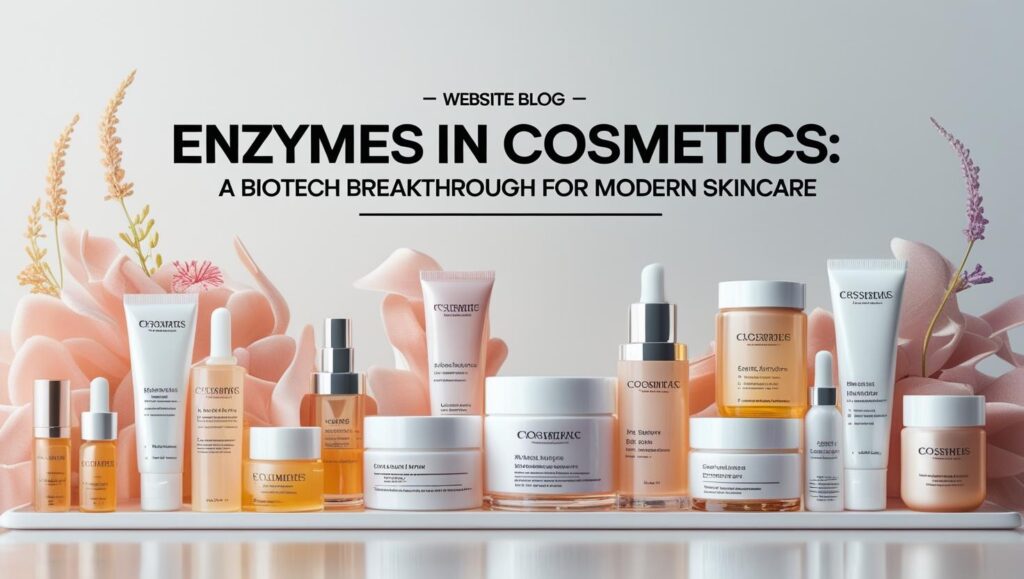
What is Biotechnology in Cosmetics?
Biotechnology in cosmetics refers to the use of biological systems, organisms, or derivatives—such as enzymes, peptides, and probiotics—to develop skin and hair care products. It enables the extraction and modification of natural active ingredients through bioengineering methods, ensuring higher efficacy, safety, and sustainability compared to traditional chemical-based formulations. Using techniques like fermentation, microbial synthesis, and enzyme expression, biotechnology is redefining how we formulate and deliver beauty solutions.
The Role of Enzymes in Cosmetic Science
Enzymes are biological catalysts that speed up biochemical reactions without being consumed. In cosmetic formulations, enzymes are used to exfoliate skin, reduce pigmentation, improve elasticity, combat acne, and enhance product penetration. Their specificity and mild action make them ideal for sensitive skin applications. Key roles include keratolytic activity (breaking down keratin), proteolysis (breaking protein bonds), and antioxidative action (neutralizing free radicals).
A Closer Look at Enzymatic Diversity in Cosmetics
Cosmetic enzymes fall into several categories, each with targeted functions:
- Proteolytic enzymes (e.g., papain, bromelain): Break down proteins and remove dead skin cells.
- Lipolytic enzymes (e.g., lipase): Break down fats, used in anti-cellulite products.
- Oxidative enzymes (e.g., superoxide dismutase, catalase): Act as antioxidants, protecting against environmental damage.
- Keratinase: Degrades keratin, useful in both skin exfoliation and hair conditioning.
- Glucose oxidase: Used in oxygen delivery systems for wound healing and skin rejuvenation.
Each enzyme is carefully selected based on pH, substrate compatibility, and desired outcome in the formulation.
Gentle Yet Effective: Enzymes and Skin Exfoliation
Unlike harsh mechanical scrubs or acid peels, enzymes exfoliate by breaking down the proteins in dead skin cells (desmosomes), encouraging natural cell turnover without irritation. Papain (from papaya) and bromelain (from pineapple) are commonly used for their proteolytic action, dissolving dead tissue and revealing fresher, brighter skin beneath. This non-abrasive approach is suitable for sensitive, acne-prone, and aging skin.
Anti-Aging Effects: A Natural Weapon Against Wrinkles
Enzymes contribute to anti-aging by boosting collagen synthesis, improving skin texture, and reducing oxidative stress. Enzymes like superoxide dismutase (SOD) and catalase neutralize free radicals that damage skin cells, leading to fine lines and sagging. Others, like protease enzymes, help remodel the extracellular matrix, improving firmness and elasticity. These mechanisms work synergistically in anti-aging serums and masks.
Enzymes in Skin Brightening: Safe and Smart Alternatives
Tyrosinase is the enzyme responsible for melanin production. Enzymatic inhibitors like kojic acid, arbutin, and certain peptides derived from biotechnology processes inhibit tyrosinase activity, reducing hyperpigmentation and promoting even-toned skin. Enzymes also gently remove pigmented keratinocytes, assisting in the skin renewal process. They offer a safer alternative to harsh bleaching agents, making them ideal for long-term brightening treatments.
Toward Sustainable Beauty: The Enzyme Advantage
Biotech enzymes are often derived from plant-based fermentation or microbial biosynthesis, reducing reliance on animal-derived ingredients or harsh synthetic chemicals. Their biodegradable nature and minimal environmental impact support the growing demand for eco-conscious skincare. Biotech fermentation also enables upcycling of food waste (e.g., pineapple skins for bromelain), contributing to a circular beauty economy.
Enzymes in Hair Care: Scalp Health and Shine
Enzymes like keratinase, protease, and lipase are increasingly being used in shampoos, conditioners, and scalp treatments. Keratinase breaks down dead scalp skin and product buildup, enhancing scalp clarity. Proteases help smooth the hair cuticle, reducing frizz and improving shine. Enzymatic detox products can also combat dandruff by targeting microbial imbalances and sebaceous blockages without irritating the scalp.
Personalized Skincare: Biotechnology Meets Individual Needs
Advanced biotech tools, such as skin microbiome analysis and genetic profiling, allow for the customization of enzyme blends based on individual skin types, conditions, and sensitivities. For instance, a person with oily skin and hyperpigmentation might benefit from a custom blend of lipase, papain, and tyrosinase inhibitors. These personalized formulations are the future of targeted, effective, and safe skincare.
Challenges in Enzyme-Based Cosmetics
Despite their benefits, formulating with enzymes poses challenges:
- Stability: Enzymes are sensitive to pH, temperature, and light.
- Formulation compatibility: Enzymes may denature when mixed with certain surfactants or preservatives.
- Shelf-life: Ensuring long-term activity in aqueous formulations is complex.
- Regulatory compliance: Biotech-derived enzymes must meet strict cosmetic regulations across regions.
Ongoing research and encapsulation technologies are helping overcome these hurdles.
Conclusion: Biotechnology is Reshaping Beauty with Enzymes
Enzyme technology, empowered by biotechnology, represents a transformative leap in the cosmetic industry. It combines efficacy, safety, and sustainability—meeting the demands of modern consumers. From exfoliation and anti-aging to brightening and personalized treatments, enzymes are proving to be powerful allies in skincare and hair care. As biotech advances, we can expect even more innovative and effective enzyme-based beauty solutions.

